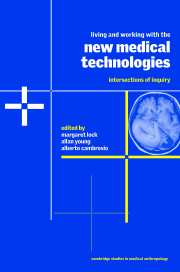Book contents
- Frontmatter
- Contents
- List of contributors
- 1 Introduction
- Part I Epochal transitions? Biomedicine and the transformation of socionature
- 2 Beyond nature and culture: modes of reasoning in the age of molecular biology and medicine
- 3 Epochs, presents, events
- Part II Laboratories and clinics: the material cultures of biomedicine
- Part III Technologies and bodies: the extended networks of biomedicine
- Index
3 - Epochs, presents, events
Published online by Cambridge University Press: 23 December 2009
- Frontmatter
- Contents
- List of contributors
- 1 Introduction
- Part I Epochal transitions? Biomedicine and the transformation of socionature
- 2 Beyond nature and culture: modes of reasoning in the age of molecular biology and medicine
- 3 Epochs, presents, events
- Part II Laboratories and clinics: the material cultures of biomedicine
- Part III Technologies and bodies: the extended networks of biomedicine
- Index
Summary
Epochs
Ethnographically, it is a distinctive fact that the field of the social studies of science is peopled by first-rate practitioners. These practitioners are frequently solicited to take meta-positions on the state of our present age and/or on the nature of things. Today, characteristically, these practitioners are responsive to such solicitations. This response is not so surprising when one considers the fact that the field arose in part to modify previous understandings of science as a rather atemporal, disembodied and theory-driven practice. Science studies in its plural manifestations has developed a dense and rich set of methods to study claims to knowledge, to analyze their embeddedness in fields of power and discourse, and to diagnose current pathologies of understanding (of nature, society and the self). There is but a small step to be taken from formulating a diagnosis of the state of the present to proposing a therapeutics. To devote oneself to the enterprise of studying the producers of the most valued forms of knowledge in our contemporary world places one in a position to pose questions about the status of all knowledge. In the light of this state of affairs the question I want to explore here is: what to make of a disjunction between the successful conceptual ground-clearing as well as often exquisite case studies that the field has contributed and some of the larger categorical meditations its leading practitioners put forward? What is at stake is an exploration of what the most encompassing analytic categories should be.
- Type
- Chapter
- Information
- Living and Working with the New Medical TechnologiesIntersections of Inquiry, pp. 31 - 46Publisher: Cambridge University PressPrint publication year: 2000
- 25
- Cited by



